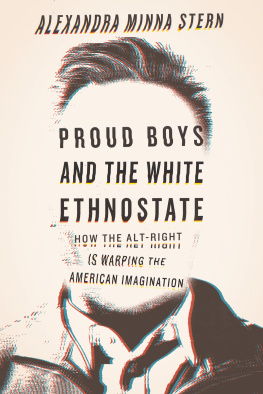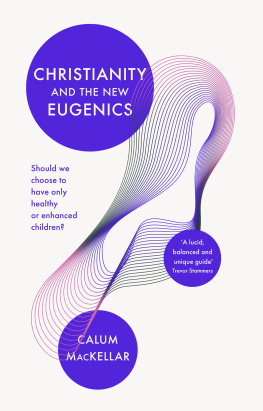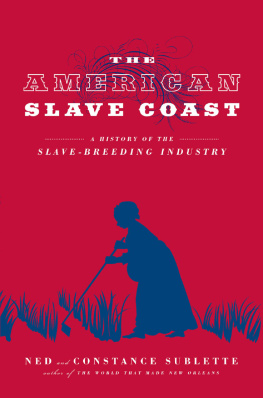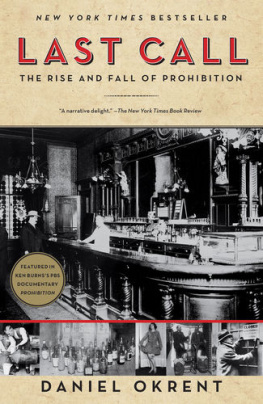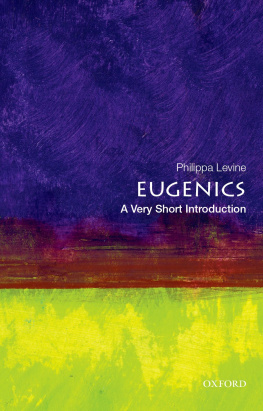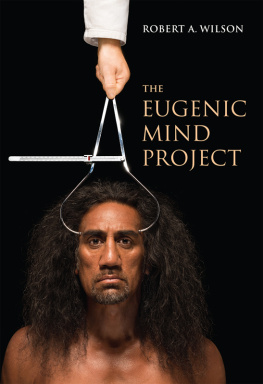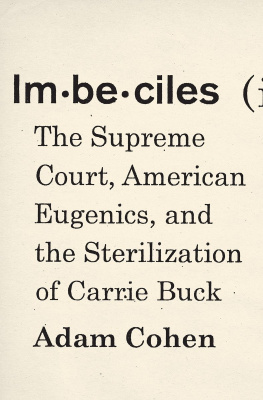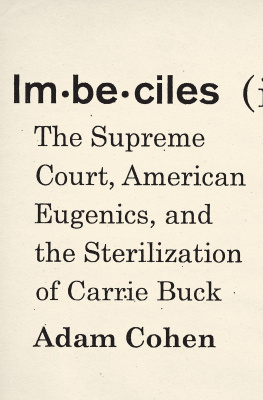Eugenic Nation
AMERICAN CROSSROADS
Edited by Earl Lewis, George Lipsitz, Peggy Pascoe, George Snchez, and Dana Takagi
1. Border Matters: Remapping American Cultural Studies, by Jos David Saldvar
2. The White Scourge: Mexicans, Blacks, and Poor Whites in Texas Cotton Culture, by Neil Foley
3. Indians in the Making: Ethnic Relations and Indian Identities around Puget Sound, by Alexandra Harmon
4. Aztln and Viet Nam: Chicano and Chicana Experiences of the War, edited by George Mariscal
5. Immigration and the Political Economy of Home: West Indian Brooklyn and American Indian Minneapolis, 19451992, by Rachel Buff
6. Epic Encounters: Culture, Media, and U.S. Interests in the Middle East, 19452000, by Melani McAlister
7. Contagious Divides: Epidemics and Race in San Franciscos Chinatown, by Nayan Shah
8. Japanese American Celebration and Conflict: A History of Ethnic Identity and Festival, 19341990, by Lon Kurashige
9. American Sensations: Class, Empire, and the Production of Popular Culture, by Shelley Streeby
10. Colored White: Transcending the Racial Past, by David R. Roediger
11. Reproducing Empire: Race, Sex, Science, and U.S. Imperialism in Puerto Rico, by Laura Briggs
12. meXicana Encounters: The Making of Social Identities on the Borderlands, by Rosa Linda Fregoso
13. Popular Culture in the Age of White Flight: Fear and Fantasy in Suburban Los Angeles, by Eric Avila
14. Ties That Bind: The Story of an Afro-Cherokee Family in Slavery and Freedom, by Tiya Miles
15. Cultural Moves: African Americans and the Politics of Representation, by Herman S. Gray
16. Emancipation Betrayed: The Hidden History of Black Organizing and White Violence in Florida from Reconstruction to the Bloody Election of 1920, by Paul Ortiz
17. Eugenic Nation: Faults and Frontiers of Better Breeding in Modern America, by Alexandra Minna Stern
18. Audiotopia: Music, Race, and America, by Josh Kun
19. Black, Brown, Yellow, and Left: Radical Activism in Southern California, by Laura Pulido
Eugenic Nation
Faults and Frontiers of Better Breeding in Modern America
Alexandra Minna Stern

University of California Press
Berkeley and Los Angeles, California
University of California Press, Ltd.
London, England
2005 by The Regents of the University of California
Library of Congress Cataloging-in-Publication Data
Stern, Alexandra.
Eugenic nation : faults and frontiers of better breeding in modern America / Alexandra Minna Stern.
p. cm.(American crossroads ; 17)
Includes bibliographical references and index.
ISBN 0-520-24443-5 (cloth : alk. paper)ISBN 0-520-24444-3 (pbk. : alk. paper)
1. EugenicsUnited StatesHistory. 2. EugenicsCaliforniaHistory. I. Title. II. Series.
HQ755.5.U5S84 2005
363.9209794dc22 | 2004021041 |
Manufactured in the United States of America
14 13 12 11 10 09 08 07 06 05
10 9 8 7 6 5 4 3 2 1
This book is printed on New Leaf EcoBook 60, containing 60% post-consumer waste, processed chlorine free; 30% de-inked recycled fiber, elemental chlorine free; and 10% FSC-certified virgin fiber, totally chlorine free. EcoBook 60 is acid-free and meets the minimum requirements of ANSI/ASTM D563401 (Permanence of Paper).
Contents
Illustrations
Acknowledgments
A book is a planned itinerary that yields unexpected journeys and much serendipity. That is certainly the case with this project, which began in a different form as a dissertation at the University of Chicago, where I was very fortunate to have the learned and inspiring guidance of George Chauncey, Friedrich Katz, Sander Gilman, and, from afar, Patricia Seed. Since that formative period, I have traveled to many places to conduct further research and moved across the country twice.
A knowledgeable archivist can be a historians greatest ally, and I thank all those who assisted me with the research for this book. In particular, I would like to acknowledge Claudia Rivers of the University of Texas at El Paso, Roy Goodman of the American Philosophical Society, Georgiana White and Sheila ONeill of the California State University at Sacramento, Carol Bowers and Leslie Shores at the American Heritage Center at the University of Wyoming, Marian L. Smith of the Immigration and Naturalization Service, Jim Coplan of the Commonwealth Club of California, and Theresa Salazar and Walter Brem of the Bancroft Library at the University of California at Berkeley for their generosity, hospitability, and expertise.
Friends and colleagues have enriched my life enormously during the preparation of this book. They have challenged me to pursue new questions, provided solace in difficult times, and brought much joy and laughter. Tony Platt, Beth Haas, Johanna Schoen, Molly Ladd-Taylor, and Vicki Ruiz read the manuscript in its entirety; I am indebted to them for their incisive comments. Peggy Pascoe has been a stellar series editor and has nurtured this project from the beginning. Howard Markel read multiple versions of every chapter and always provided constructive criticism. Many other people have taken time to read parts of this book or helped me along in the writing process. They include Carol Karlsen, Rob Buffington, Ann Stoler, Laura Briggs, Nayan Shah, George Lipsitz, Anne-Emanuelle Birn, Steven Palmer, Penny Von Eschen, Gina Morantz-Sanchez, Gabriela Arredondo, Ernie Chavez, Marty Pernick, John Carson, Diane Paul, Sam Truett, Terri Koreck, Elliott Young, Emma Prez, Dana Frank, Maria Montoya, Nancy Chen, Ellen Herman, Mary Joe Gilpin, John Gilpin, Mary Parsons, Mary Lou Stern, Andrew Stern, Barbara Berglund, Jennifer Robertson, Ilona Katzew, Paul Kramer, and Paul Lombardo.
The Center for the History of Medicine at the University of Michigan Medical School has been the ideal environment for thinking about the implications of the history explored in this book. I thank Allen Lichter, David Bloom, Howard Markel, and Tim Johnson for their commitment to medical humanities and history. I have also benefited greatly from the intellectual engagement of colleagues in the American Culture program and the Science, Technology, and Society program. I would like to acknowledge the excellent research assistance of Jos Amador and Shawn Kimmel, as well as the top-notch administrative skills of Jeff Clevenger. Finally, many thanks to the supportive scholars and friends at the University of California at Santa Cruz, especially those affiliated with the Chicano Latino Research Center.
Envisioning and enacting the transformation of manuscript into book would not have been possible without the dynamism and professionalism of my editor, Monica McCormick, and her editorial assistant, Randy Heyman. It was a pleasure to work closely with both of them. John Thompson, of Biomedical Communications at the University of Michigan, applied his digital and design skills to optimize the images in this book.
Grants and fellowships enabled me to conduct much of the research for this project. These included an American Heritage Center travel grant, two University of California Committee on Research grants, a Social Science Research Council International Migration Fellowship, an Albert J. Beveridge Grant from the American Historical Association, a Mellon travel grant from the University of Chicago, and a Fulbright Hays / U.S. Department of Education fellowship.


